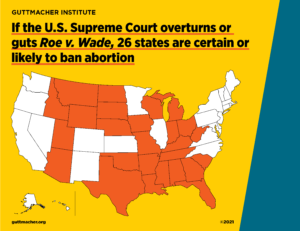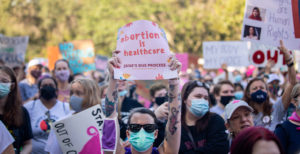Surrogacy and the End of Roe v. Wade
What the Supreme Court decision changes and what it doesn't
The topic on everyone’s mind these days is: How does the recent Supreme Court ruling on abortion affect the surrogacy process? Here’s our best assessment of what does and does not change in the post-Roe v. Wade world.
Background
Last week, the Supreme Court overturned Roe v. Wade, which had recognized a constitutional right to decide whether or not to terminate a pregnancy, and Planned Parenthood v. Casey, which reaffirmed that right in 1992. In Dobbs v. Jackson Women’s Health Organization, the Court held, by a vote of 5-4, that the Constitution does not confer a right to abortion and regulation of abortion will be a matter of state and federal legislation.
Per a 2021 analysis by the Guttmacher Institute, the practical result is that at least 26 states are certain or likely to ban abortion. Twenty-two of those states have laws or constitutional amendments already in place that makes them virtually certain to ban abortion: Alabama, Arizona, Arkansas, Georgia, Idaho, Iowa, Kentucky, Louisiana, Michigan, Mississippi, Missouri, North Dakota, Ohio, Oklahoma, South Carolina, South Dakota, Tennessee, Texas, Utah, West Virginia, Wisconsin, and Wyoming. An additional four are likely to ban abortion in short order: Florida, Indiana, Montana, and Nebraska. Ongoing court battles will continue to change this list and timeline (for example, at the time of this writing, judges in Utah and Louisiana blocked those states’ trigger laws from taking effect). And other analyses conclude that 28 states will ban abortion in a post-Roe world. (Note: the 2021 map below does not necessarily reflect the present reality as the legal landscape changes.)

Our General Opinion
Before we dive into how Dobbs is likely to affect intended parents and gestational carriers, Brownstone Surrogacy wants to make clear: We believe in a woman’s right to choose. We believe the decision is wrong as a matter of constitutional law–our founder and executive director is an attorney and served as a clerk to two federal judges–and wrong as a matter of policy. The result of this decision is that women will unnecessarily die. Brownstone agrees with the dissenting justices, who wrote that “When the majority says that we must read our foundational charter as viewed at the time of ratification … it consigns women to second-class citizenship.”
As many are already noting, including our founder, the decision may also have wide-ranging ramifications for other constitutional rights: contraception, sexual intimacy outside of marriage, interracial marriage, and same-sex marriage. The majority opinion pooh-poohs these concerns, essentially saying that abortion is unique, but don’t listen to them. The threat is real. Brownstone is here for you if you want to discuss how best to protect your embryos, your marriage, or your children. For now, however, here’s our best assessment for how Dobbs affects surrogacy.
What the Supreme Court Decision Does NOT Change about Gestational Surrogacy
The truth is that even under Roe and even in the most liberal states with the broadest protections of reproductive freedom, there is no mechanism to force a pregnant person to terminate or selectively reduce a pregnancy they do not want to terminate/reduce OR to force a pregnant person to sustain a pregnancy that they want to terminate/reduce. That fundamental right of bodily autonomy, which is enshrined in New York’s Surrogate’s Bill of Rights, means that properly matching intended parents and gestational carriers has always included ensuring that everyone is on the same page about termination and selective reduction.

At Brownstone, we talk through many hypothetical scenarios to make sure our match sees eye-to-eye. Moreover, the mental health professionals conducting the psychological evaluations and the attorneys working with the parties to draft the gestational surrogacy agreement are also pressing the intended parents and surrogate on the same areas. We want to make sure the surrogate is willing to defer to the intended parents’ decisions. We also want to make sure that the surrogate is willing and able to travel out-of-state as needed to secure a legal termination or reduction (at the intended parents’ expense). (Thankfully, the constitutional right to travel does not seem to face an immediate threat from the Supreme Court.) Fundamentally, the Dobbs decision to overturn Roe does NOT change the already great importance of finding total agreement.
What the Supreme Court Decision DOES Change about Gestational Surrogacy
The Safety of a Pregnant Person
The treatment for an ectopic pregnancy is an abortion. The treatment for an incomplete miscarriage is an abortion. If a miscarriage is not managed to a safe completion, there is a risk of uterine perforation, organ failure, infection, infertility, and death. If these types of abortions are not legal or are not easily accessible in a surrogate’s local area, she won’t always have the time to travel out-of-state without significant risk to her health.
At Brownstone, these are the scenarios that keep us up at night and why we keep a close watch on what is happening in different states. While terminations are exceedingly rare in surrogacy arrangements and ectopic pregnancies are also rare, we want to make sure that every surrogate knows the lay of the land in her own state and what risks she’s taking on, beyond the significant risks of any pregnancy. For now, we continue to actively recruit, screen, and match surrogate candidates from states which have or will enact abortion bans, but the danger posed to a surrogate may change that map in the future.
“Personhood” Bills and the Impact on IVF
Some states will undoubtedly rush to pass legislation granting personhood status from “the moment of conception.” If a zygote, embryo, blastocyst, or fetus has exactly the same constitutional rights as people, then what does that mean for (1) discarding an embryo (normal or aneuploid); (2) donating embryos to scientific research; or (3) biopsying an embryo for PGT-A or PGT-M testing? Is that akin to murder or assault? Are doctors going to have to fertilize one egg at a time and transfer every fertilized egg? Legal experts are unsure. If you have cryopreserved embryos in a state susceptible to a personhood bill, it may behoove you to transport them to a more protective state.
Finally, even if you are in a state unlikely to ban abortion in the nearterm, you may still be affected. If Republicans retake the House and Senate in 2022 and a Republican president follows President Biden in 2024, a nationwide ban on abortion is possible, even if unlikely.
* * *
The Dobbs decision is a gut punch to those of us who devote our professional lives to bringing children into this world safely and securely. Our work will go on and we still believe deeply that it remains a great time to become a surrogate or to have a child through surrogacy. But we will keep a close eye on legal developments and suggest you do the same.
This post does not constitute legal or medical advice and should not be relied upon as expert advice.
